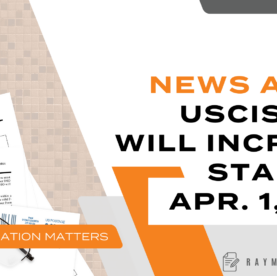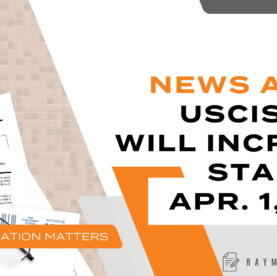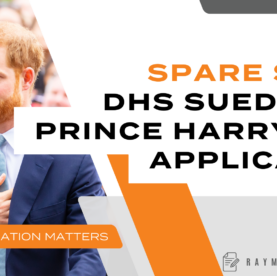USCIS Reaches Annual H-1B Petition Cap for Year

The United States Citizenship & Immigration Services (USCIS) announced that it has received enough registrations for the H-1B, Nonimmigrant Specialty Employee visa program petition to meet the annual statutory cap for the Fiscal Year 2021 on the number of H-1B visas permitted to be issued to foreign nationals. Since the USCIS received more than the 65,000 H-1B visas allotted to those with a Bachelor’s Degree and the additional 20,000 visas allotted for foreign nationals with a Master’s Degree or higher, the USCIS conducted a lottery and randomly selected the statutorily set maximum number of H-1B nonimmigrant visa petitions.
Employers who submitted H-1B nonimmigrant visa requests will be notified no later than March 31, 2020, if their request was selected. Those that were not selected will remain in consideration through September 30, 2020, for possible later selection if cap subject H-1B nonimmigrant visa petitions that were originally selected are denied or withdrawn.
Employers that received notification from the USCIS that their H-1B nonimmigrant visa request has been selected are encouraged to immediately retain business immigration counsel to move forward with the required nonimmigrant petitions, supporting documents and addenda, and filing fees.
The H-1B nonimmigrant visa program allows U.S. employers to sponsor foreign nationals to temporarily relocate to the United States to work in a position that is deemed a “specialty occupation,” which is broadly defined as a position that normally requires the minimum of a bachelor’s degree, or higher, in a specialty field. The H-1B program permits temporary employment for an initial duration of up to three years with extensions available to allow a foreign national to hold H-1B status for no more than six years.
To qualify for the H-1B temporary nonimmigrant specialty worker program, there must exist an employer-employee relationship, or the intent to enter into an employer-employee relationship if the H-1B visa petition is approved. The employer is required to pay at least the actual wage or the U.S. Department of Labor (DOL) prevailing wage, whichever is higher, and must seek certification of the job from the DOL through the filing of a labor condition application. Moreover, the foreign national’s field of study must relate to the job offered and must qualify as a “specialty occupation.” The Immigration & Nationality Act (INA) defines a “specialty occupation” as one that meets at least one of the following:
- A bachelor’s or higher degree, or its equivalent is normally the minimum requirement for the particular position
- The degree requirement is common for the position in the industry or the job is so complex or unique that it can only be performed by someone with at least a bachelor’s degree in a field related to the position
- The employer normally requires a degree or its equivalent for the position
- The nature of the specific duties is so specialized and complex that the knowledge required to perform the duties is usually associated with the attainment of a bachelor’s or higher degree
Each year, hundreds of thousands of H-1B nonimmigrant visa petitions are submitted to the USCIS by employers across the United States seeking to employ foreign talent for specialty occupations, such as those related to information technology, engineering, management consulting, education, and finance. To protect American jobs, Congress limits the number of H-1B visa petition that may be issued to foreign nationals each year to 65,000 for those with a Bachelor’s Degree, together with an additional 20,000 to foreign nationals with a Master’s Degree or higher.
To learn more about this blog post or if you have any other immigration concerns, please feel free to contact me at rglahoud@norris-law.com or (484) 544-0022.





